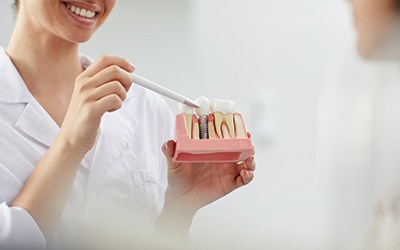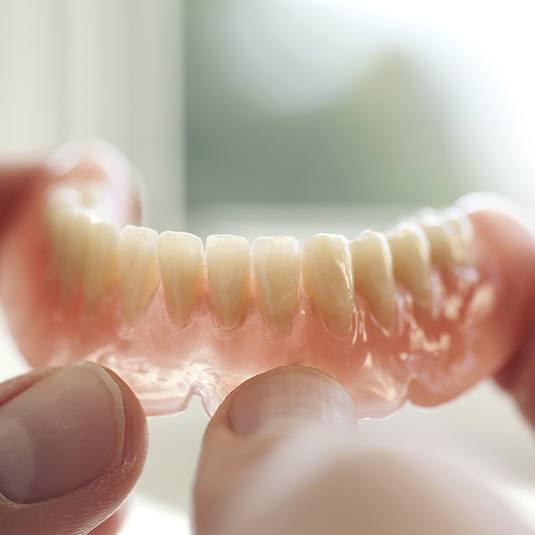Dentures – Cherry Hill, NJ
Enjoy a Complete Smile Again
You never expected to lose your teeth, but now you are facing the reality of tooth loss. If you have lost all your natural teeth, it can be devastating to your confidence and your quality of life. At Meadvin Dental, Dr. Jodi B. Meadvin can rebuild a beautiful, functional smile with dentures in Cherry Hill. Although they have a bad reputation for looking and feeling fake, there is no need to worry. New advancements in dentistry now make them look and feel more realistic than ever.

Why Choose Meadvin Dental for Dentures?
- Various Options, Personalized Treatment
- Use of Modern Technology and Techniques
- Each Patient Treated Like Part of the Family
Who’s a Good Candidate for Dentures?

Whether it’s just a few or a whole mouthful, it doesn't really matter how many teeth you’re missing; nearly anyone can restore their smile with the help of dentures. But first, you’ll need to schedule a consultation with Dr. Meadvin so she can determine whether you’re eligible for treatment. If you’re not, you may still be able to be by restoring the health of your gum tissue and bone structure.

Effects of Missing Teeth
There are many reasons why you may be missing permanent teeth, such as tooth decay, gum disease, or even dental injury. But no matter what the cause of your tooth loss is, the risk of not replacing missing teeth can be equally devastating, and includes things like facial sagging, difficulty speaking, trouble eating, and lower self-esteem and depression.

What Qualifies You for Dentures?
Dentures can be an excellent solution for patients who have experienced significant tooth loss, have sensitive teeth, and excessive tooth decay, but who also have sufficient healthy gum tissue and jawbone density. Patients who receive dentures must also be willing to commit to their oral health routine and properly care for their dentures and smile.
The number of teeth you’re missing will ultimately determine which type of denture Dr. Meadvin recommends for you, as there are different ones to choose from, including full dentures, partial dentures, and implant dentures.
Dentures also have the benefit of being more affordable than other tooth replacement options, making them a great choice for patients on a smaller budget.

Alternative Tooth-Replacement Options
If it is determined that you’re not a good candidate for dentures, there may be other options available to consider such as dental bridges or dental implants.
- Dental Bridges: These restorations are ideal for patients who are only missing a few teeth. They do require you to have healthy teeth surrounding the missing tooth or teeth to support your bridge.
- Dental Implants: Because a titanium post must be inserted into your jawbone, you must have a solid bone structure prior to getting dental implants. If not, you may need a preliminary procedure such as a bone graft or sinus lift. Dental implants are also more costly than traditional dentures, but they have the amazing benefit of being permanent.
Different Types of Dentures

Although you may think all dentures are the same, there are actually several different options. Dr. Meadvin performs an initial consultation to evaluate your oral health and discusses your goals to choose a treatment that best meets your needs and your lifestyle.
- Partial Denture: Several missing teeth are replaced with a partial denture. Custom-made prosthetic teeth are designed to match the appearance of your natural ones. They are attached to a gum-colored base, which features a metal framework. This allows it to clip or clasp onto your teeth to hold it in place.
- Full Denture: An entire arch is replaced using a full denture. Dr. Meadvin takes an impression of your mouth to create an acrylic base, which is held to your gum tissue using suction or an adhesive.
- Implant-Retained: You can secure your denture to your jaw using surgically placed dental implant posts.
How Dentures are Made

Those considering dentures for the first time may want to know how they’re made. After all, knowing what goes into them – materials, methods, etc. – would help inform your treatment decision. If that sounds nice to you, good news: our practice can explain how dentures are created. Just read over the facts below, and you’ll learn the relevant ins and outs. Otherwise, please call us soon to hear more details over the phone.

What are Dentures Made Of?
Whether it’s partial, full, or even implant-based, every denture has a base and artificial teeth. These components are crucial to the whole restoration and ensure it works well.
A denture’s base is its overall foundation, the part that keeps its artificial teeth secure. As such, it’s typically made of pink-colored acrylic, nylon, porcelain, or resin. A full denture’s base often uses acrylic, while partial dentures have metal clips with an acrylic base.
Per their name, the artificial teeth are a denture’s tooth-replacing parts. Labs will thus make them from resin or porcelain to match your enamel’s color. All that said, porcelain remains the more popular material due to its higher durability.

The Denture Creation Process
Since each denture is customized for its patient, making one involves many steps. These actions include the following:
- Step 1: At the start, Dr. Baldwin uses a dental impression to design a plaster model. This model will match your final denture’s size and shape.
- Step 2: Our practice will send the plaster model to the lab, which will rely on it to make a wax gumline.
- Step 3: The lab will put artificial teeth in the wax gumline, forming a prototype denture.
- Step 4: We’ll check the prototype against your mouth after we get it back. From there, we’ll return it when we’ve confirmed its fit.
- Step 5: The dental lab will place the prototype in a flask after removing its wax. Next, they’ll apply plaster to the flask and have it sit in hot water.
- Step 6: To keep any acrylic from sticking, a separator will go into the plaster layer. The acrylic will then be injected into the flask to replace the wax.
- Step 7: The dental lab will remove all plaster to reveal the final denture. Then, they’ll place the restoration in a bath to remove its residue.
- Step 8: Once the residue is removed, lab workers will remove your denture’s excess acrylic and polish its surface.
- Step 9: Our office will fit your final denture for you to ensure it works properly.

Adjusting to Your New Dentures
Naturally enough, your mouth may feel sore as you adjust to dentures. You needn’t worry about this ache, though; it’s temporary and fades within days. Your prosthetics won’t cause any pain once you’ve used them enough, and they’ll feel quite familiar.
You can speed up your adjustment, if necessary, though. The best way is typically to eat soft foods that don’t irritate your gum tissue. On the other hand, you could apply adhesives for added security, exercise facial muscles, and so on.
If your adjustment pain persists, please call us. Your ache may indicate a need for further alterations.
Benefits of Dentures

If you’re missing multiple teeth, it can be challenging to complete daily tasks, like chewing your food thoroughly, speaking clearly, and smiling without feeling self-conscious. Fortunately, dentures are available to completely transform the function and appearance of your smile. If you’ve suffered from tooth loss, here are just some of the many ways that dentures can completely turn around your quality of life for the better!

Psychological Benefits
People who don’t have any teeth often have a difficult time accepting tooth loss, so they are less likely to engage in social activities. They are also at a higher risk of experiencing sadness and depression. By restoring one’s smile with dentures, patients can experience an increase in their confidence and self-esteem, helping them to enjoy the activities they used to.

Clearer Enunciation
It can be difficult to speak clearly when you’re missing teeth. In order to pronounce and perform words properly, you need to be able to touch your tongue to your teeth. Otherwise, they become very difficult to enunciate. Dentures act as the missing teeth, therefore allowing you to pronounce your words more clearly while speaking. After just a short adjustment period, you will be talking just like you used to!

Improves Nutrition
Many of the foods that are best for your health are tough in texture. This includes nutritious vegetables, fruits, and healthy proteins. Because of this, many sufferers of tooth loss are missing out on the vitamins and minerals they need to thrive. With an improved ability to chew, dentures allow for a more expansive diet full of nutritious foods. Ultimately, dentures can help your body receive the essential nutrients needed for optimal health!

Preserves Oral Health
If you still have some healthy remaining teeth, getting dentures can help to keep them in good shape for longer. Dentures prevent them from shifting to other areas of the mouth and bear some of the weight of regular chewing. This helps to reduce the wear and tear of your teeth over time.

Expands Opportunity
According to a 2019 study, the probability of being employed was negatively associated with poor oral health. Your smile is one of the very first things that people notice about you. If you have an upcoming job interview, a date, or are looking to expand your social circle, having a complete smile will help you make a great first impression.
Care and Maintenance

On average, you can expect your dentures to last 5 to 8 years before needing to be replaced; however, there are several things you can do to promote their longevity, such as:
- Place a towel on the counter and floor when you handle your dentures in case you drop them.
- Remove and rinse your denture after eating to clean off food particles and debris.
- Handle your dentures carefully, so you do not bend or break them.
- Clean your mouth with a soft-bristled toothbrush when you remove your dentures.
- Brush your dentures with a soft-bristled toothbrush at least once a day.
- Soak your denture in a cleaning solution overnight.
- Rinse your denture before placing it back in your mouth.
- Avoid eating or drinking overly hot foods and drinks to prevent your denture from warping.
- Visit your dentist regularly for checkups.
- Have your dentures adjusted as needed.
Understanding the Cost of Dentures

Your dentures will be tailored uniquely to you, which is part of why they’re so effective as a tooth replacement option. However, this also means that it can be a little bit difficult to determine precisely what your prosthetic is going to cost without meeting you first.
That said, if you’re budgeting for your upcoming procedure, there are a few guidelines you may want to keep in mind. If you’re curious, here’s what you should know.

Factors that Affect the Cost of Dentures
If you’re wondering what you can expect your dentures to eventually cost, there are a few factors that you might want to consider. First of all, there are often some preliminary procedures that are necessary before getting your prosthetic, like tooth extractions.
Then there’s the material that your dentures are made from, i.e., the acrylic used for the base and the substance that the replacement teeth are constructed from. Which one you pick will come down to a balance between what you’re willing to pay and your individual needs.

Are Implant Dentures More Expensive?
Implant dentures are connected to thin metal posts that are surgically placed into the jaw, affording them additional stability. As you can imagine, the necessary surgery and the additional materials involved do add to the cost of the treatment, making implant dentures more expensive. However, implant dentures also last considerably longer than their traditional counterparts, which means that it’s possible to save money in the long run on replacements.

Does Dental Insurance Cover Dentures?
Dentures are typically only used when they’re medically necessary, which means that they’re usually well within the realm of what will be covered by dental insurance. If you’ve met your deductible and have yet to exceed your yearly maximum, your dental plan could cover as much as 50% of the overall cost of your dental care.

Other Options for Making Dentures Affordable
We also know that not everyone has insurance, which is why we offer alternatives that can help to make the care that our patients receive more affordable. We have a dental membership plan that makes for an excellent alternative to insurance, without the deductibles or waiting periods. For a flat annual fee, you can get a 15% discount on your dentures, as well as a host of complimentary services that can make upkeep much more budget-friendly.
If you’re interested in this or any other financial option that can make dentistry affordable, give us a call and we’ll be happy to talk to you about it.
Dentures FAQs

Although missing teeth can be an unexpected reality, the fact that you’re opting for dentures to restore your smile is a great first step. Dentures have come a long way, which means there are probably several questions you have about them. Dr. Meadvin wants to ensure you have all the information you need to feel confident in your tooth replacement decision, so she has compiled a list of frequently asked questions about dentures in Cherry Hill to help you learn more about this process and your new smile.
Is it Difficult Adjusting to Wearing Dentures?

It’s natural to have a short adjustment period when you first start wearing your dentures. This is a foreign object in your mouth, and your cheeks, lips, and tongue need to get used to the new piece existing in your mouth. Some tips that will help during this period include:
- Practice speaking in front of a mirror
- Eat soft foods in the beginning and slowly work your way up to solid, heartier foods
Before you know it, you’ll have the confidence you need to speak, eat, and chew clearly, and living with dentures will become second nature.
Will My Dentures Slip?

In the past, you’ve probably heard horror stories about older people wearing dentures and while talking to their grandchild or while out to eat, their dentures have fallen out. Not only do you not want to scare someone, but the idea of them falling out is just all-around embarrassing. Luckily, the advancements that have been made in the world of dentures have made it so slippage is very rarely ever a problem.
How Often Will I Need to Replace My Dentures?

Your dentures will typically last 5 to 8 years. Throughout this time, you may need them realigned or readjusted, but with proper care and maintenance, you can promote their longevity. Dr. Meadvin will instruct you as to how you can care for your new dentures, and what you should do if you accidentally drop or break one.
How Often Do I See My Dentist When Wearing Dentures?

Whether you’ve received partial or full dentures, it’s imperative that you continue to see Dr. Meadvin twice a year for regular checkups. These appointments aren’t just for cleanings. They also allow us to examine your mouth, neck, and throat for any signs of oral cancer. Because the likeliness to develop this disease increases with age, early detection is important.
Also, these appointments give your dentist in Cherry Hill the opportunity to check your dentures for any damages or bite issues you may be having.
Schedule Your Appointment

Invest in a beautiful, functional smile. Dr. Meadvin can replace your missing teeth with dentures. Contact our office today to schedule your consultation.
